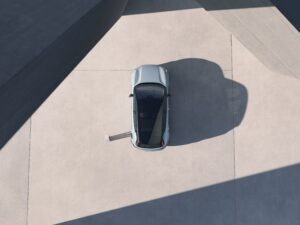
Volvo shares plans to use near-zero emission & recycled sheet steel
By onAnnouncements | Business Practices | Market Trends
Volvo says it has secured access to near-zero emission primary and recycled sheet steel and plans to use it in an upcoming car program.
The automaker shared its plans when announcing that it is now a member of the World Economic Forum’s First Movers Coalition. Volvo said its participation signals its plans to put “purchasing power behind emerging clean technologies that will support the shift to near-zero emission aluminum.”
“The world urgently needs to come together and act, to avoid the worst effects of climate change,” Javier Varela, Volvo’s CEO, said ahead of the United Nations Climate Change Conference (COP28). “We’re committed to doing our part and we call on corporate and political leaders around the globe to also do theirs.”
Volvo is sourcing its steel from Swedish company SSAB, which said steel production represents up to 9% of global carbon emissions and that abating those emissions is “vital” to mitigating climate change.
One downside to near-zero emission steel is the cost; it’s pricier to produce, and more expensive to buy.
SSAB, which said it made the world’s first pilot deliveries of fossil-free steel in 2021, is calling for legislative and permitting changes that would further advance production of near-zero emission steel.
“Our research and innovation and production of fossil-free steel can change an entire industry and its value chain,” said Martin Pei, SSAB’s chief technology. “Now policymakers nationally and globally need to create the right conditions to support the steel industry’s green transition.”
It isn’t the only company working to advance environmentally friendly steel. Earlier this year, WorldAutoSteel Nucor unveiled plans for launching Steel E-Motive, its new vehicle concept for Mobility as a Service (MaaS).
WorldAutoSteel said at the time that it would make its Steel E-Motive portfolio of materials and methods freely available to automakers worldwide because of the group’s belief that steel has a vital role in achieving a zero-emissions future in transportation.
Steel E-Motive can be produced using existing global manufacturing and supply resources at attractive cost levels and profit margins, making it possible for production to start as soon as 2030, according to WorldAutoSteel. It’s estimated that production emissions would be significantly reduced because of a design that minimizes material thickness and maximizes material utilization.
Volvo said it plans to begin using the steel it has acquired from SAAB in one of its car programs by 2026. The OEM aims to reduce its carbon emissions by 75% per car by 2030, compared to a 2018 baseline. The automaker has previously pledged to only sell fully electric cars by 2030 and plans to phase out hybrids and internal combustion engine (ICE) vehicles over the course of this decade. It said it will produce its last ICE car early next year.
Earlier this year, Volvo revealed its smallest all-electric SUV, expanding its EV portfolio to four models.
The EX30 debuted in Milan, Italy in June and Volvo said it will “help us capture growing demand for fully electric cars in a fast-growing segment.”
During the first nine months of 2023, fully electric cars made up 16% of Volvo’s overall sales, the OEM said.
Images
Featured image courtesy of Volvo
